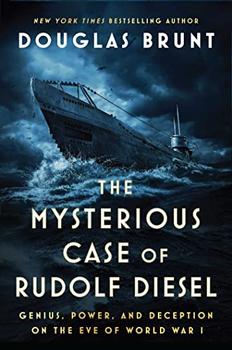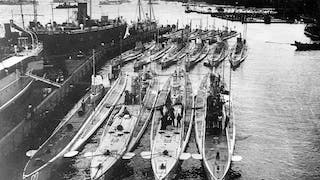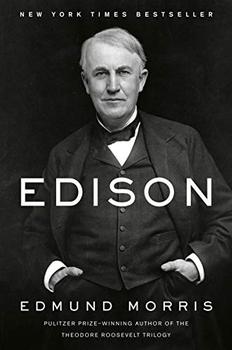Summary | Excerpt | Reviews | Beyond the book | Read-Alikes | Genres & Themes | Author Bio
Genius, Power, and Deception on the Eve of World War I

Critics' Opinion:
Readers' Opinion:
First Published:
Sep 2023, 384 pages
Paperback:
Oct 1, 2024, 384 pages
 Book Reviewed by:
Book Reviewed by:
Jordan Lynch
Buy This Book
The hidden history of one of the world's greatest inventors, a man who disrupted the status quo and then disappeared into thin air on the eve of World War I - this book answers the hundred-year-old mystery of what really became of Rudolf Diesel.
September 29, 1913: the steamship Dresden is halfway between Belgium and England. On board is one of the most famous men in the world, Rudolf Diesel, whose new internal combustion engine is on the verge of revolutionizing global industry forever. But Diesel never arrives at his destination. He vanishes during the night and headlines around the world wonder if it was an accident, suicide, or murder.
After rising from an impoverished European childhood, Diesel had become a multi-millionaire with his powerful engine that does not require expensive petroleum-based fuel. In doing so, he became not only an international celebrity but also the enemy of two extremely powerful men: Kaiser Wilhelm II of Germany and John D. Rockefeller, the founder of Standard Oil and the richest man in the world.
The Kaiser wanted the engine to power a fleet of submarines that would finally allow him to challenge Great Britain's Royal Navy. But Diesel had intended for his engine to be used for the betterment of mankind and refused to keep the technology out of the hands of the British or any other nation. For John D. Rockefeller, the engine was nothing less than an existential threat to his vast and lucrative oil empire. As electric lighting began to replace kerosene lamps, Rockefeller's bottom line depended on the world's growing thirst for gasoline to power its automobiles and industries.
At the outset of this new age of electricity and oil, Europe stood on the precipice of war. Rudolf Diesel grew increasingly concerned about Germany's rising nationalism and military spending. The inventor was on his way to London to establish a new company that would help Britain improve its failing submarine program when he disappeared.
Now, New York Times bestselling author Douglas Brunt reopens the case and provides an astonishing new conclusion about Diesel's fate.
PROLOGUE
OCTOBER 11, 1913.
There was something in the water.
Crew members of the Dutch pilot steamer Coertzen approached the object that had caught their attention. There, near the mouth of the Scheldt River along the eastern edge of the English Channel, in the rippling black, the men on the small vessel realized what they'd seen.
It was a body.
Though the decomposition was ghastly, the sailors noticed the fine quality of the clothing that still wrapped the body. Pulling the remains alongside the boat, they plucked four items from the pockets of the deceased before releasing the rotting corpse back into the waves: a coin purse, a penknife, an eyeglass case, and an enameled pillbox. The steamer then made its scheduled call to the Dutch port city of Vlissingen, where the crew reported the discovery and turned over the items.
Harbor officials immediately wondered if the report from the Coertzen could be connected to the missing person case that had been in the headlines of ...
Rudolf Diesel was a man ahead of his time. He used creativity and ingenuity to invent things that he truly believed would help society, and he remained optimistic and determined despite many hardships and setbacks. Although the circumstances of his death remain a mystery, Brunt's chronicle of his life and times raises the specter of "what if" and provides a fascinating alternative account of Diesel’s fate. Equal parts biography, military history, and political thriller, The Mysterious Case of Rudolf Diesel weaves a tale of genius and war that will bring the forgotten story of Rudolf Diesel to a new generation...continued
Full Review
 (884 words)
(884 words)
(Reviewed by Jordan Lynch).
 Dan Abrams, New York Times bestselling author of Lincoln's Last Trial
A page turning crime thriller that also delivers a significant new understanding of the forces that shaped the outcome of World War I and beyond. This fascinating story, told in the most vivid fashion, about a name so many recognize has been missed by true crime aficionados and historians alike—until now. An important addition to 20th century history.
Dan Abrams, New York Times bestselling author of Lincoln's Last Trial
A page turning crime thriller that also delivers a significant new understanding of the forces that shaped the outcome of World War I and beyond. This fascinating story, told in the most vivid fashion, about a name so many recognize has been missed by true crime aficionados and historians alike—until now. An important addition to 20th century history. Jay Winik, New York Times bestselling author of 1944: FDR and the Year that Changed History
Equal parts Walter Isaacson and Sherlock Holmes, The Mysterious Case of Rudolf Diesel yanks back the curtain on the greatest caper of the 20th century in this riveting history.
Jay Winik, New York Times bestselling author of 1944: FDR and the Year that Changed History
Equal parts Walter Isaacson and Sherlock Holmes, The Mysterious Case of Rudolf Diesel yanks back the curtain on the greatest caper of the 20th century in this riveting history. Lee Child, #1 New York Times bestselling author
Outstanding—Brunt mixes a historian's respect for research with a novelist's eye for character, adds fascinating context and connections, and reaches a conclusion worthy of James Bond.
Lee Child, #1 New York Times bestselling author
Outstanding—Brunt mixes a historian's respect for research with a novelist's eye for character, adds fascinating context and connections, and reaches a conclusion worthy of James Bond. Douglas Brunt’s The Mysterious Case of Rudolf Diesel tells the story of Rudolf Diesel, the German inventor of the internal combustion engine. After the Industrial Revolution, industry had become king, and Diesel’s groundbreaking invention produced more power, used cheaper fuel and didn’t require a team of laborers to keep running. The railroad industry immediately adopted the diesel engines, but its use in naval vessels also played a key role in the tension between European nations—particularly Germany and Britain—that eventually erupted into World War I.
Douglas Brunt’s The Mysterious Case of Rudolf Diesel tells the story of Rudolf Diesel, the German inventor of the internal combustion engine. After the Industrial Revolution, industry had become king, and Diesel’s groundbreaking invention produced more power, used cheaper fuel and didn’t require a team of laborers to keep running. The railroad industry immediately adopted the diesel engines, but its use in naval vessels also played a key role in the tension between European nations—particularly Germany and Britain—that eventually erupted into World War I.
Prior to WWI, Germany had a weak navy, especially compared to Britain's. Despite a massive naval expansion, Germany still failed to compete with the ...

If you liked The Mysterious Case of Rudolf Diesel, try these:

by Geoffrey Wheatcroft
Published 2023
A major reassessment of Winston Churchill that examines his lasting influence in politics and culture.

by Edmund Morris
Published 2020
From Pulitzer Prize-winning author Edmund Morris comes a revelatory new biography of Thomas Alva Edison, the most prolific genius in American history.





The House on Biscayne Bay
by Chanel Cleeton
As death stalks a gothic mansion in Miami, the lives of two women intertwine as the past and present collide.

The Flower Sisters
by Michelle Collins Anderson
From the new Fannie Flagg of the Ozarks, a richly-woven story of family, forgiveness, and reinvention.

The Funeral Cryer by Wenyan Lu
Debut novelist Wenyan Lu brings us this witty yet profound story about one woman's midlife reawakening in contemporary rural China.
Your guide toexceptional books
BookBrowse seeks out and recommends the best in contemporary fiction and nonfiction—books that not only engage and entertain but also deepen our understanding of ourselves and the world around us.